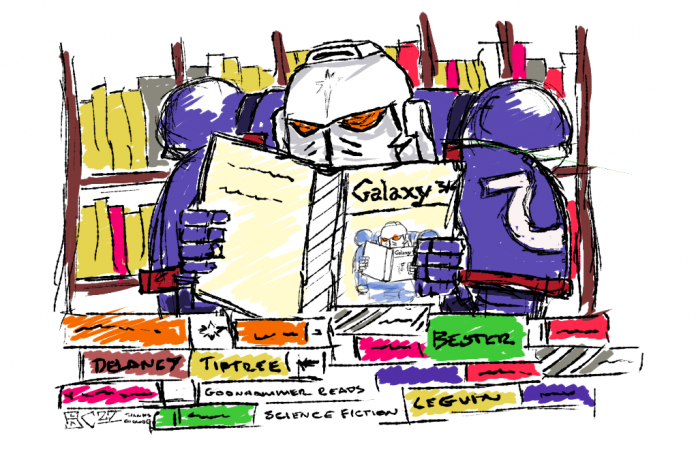Utopian fiction is rarer than its darker mirror, but serves more or less the same purpose. Where Dystopia asks us to reflect on the steps between now and when, and how we may avoid or survive whatever the author threatens us with, Utopian fiction tends to reflect much more on the now, throwing harsh (and often satirical) light on the now as a pale, imperfect copy of the when. As a result, Utopias often talk about the impossibility of true and complete happiness, or the unreachable ideal of the perfect society, or how we act in our times that impedes the establishment of better worlds. A Utopia is not without challenges, as either internal or external forces threaten stability and balance, and good utopian fiction provides a window into a better world that makes us reflect – for good and ill – on our own.
We could start off here with the granddaddy of all Utopian fiction, if not SF as a concept, in Tomas More’s Utopia, published in 1516. Utopia is a religious, political and colonialist satire and laid a lot of the conceptual groundwork for several hundred years of “how you write a book about a utopian society” – in addition to coining the word. Utopia is a fun and interesting little read and worth checking out – but it’s not our first recommend because….
Marge Piercy – Woman on the Edge of Time
Well, because Woman on the Edge of Time is Great.

When Connie Ramos is unjustly sectioned and imprisoned in the mid 1970s, she begins to receive communication from Luciente, a 22nd century empath and member of a kinder, just-er, fairer society. Luciente’s future isn’t the only path available though, and it is down to Connie to see the new world born, at any personal cost. We’re never sure if Connie’s visions are time travel, psychosis or a reaction to the utterly brutal – and horrifically accurate to our world – treatment she receives at the hands of the US health and prison service. But whatever they are, they feel real – to her and to us.
Luciente’s society is structured around a respectful care for the needs and wishes of others, where self reflection and a dedication to social good is a paramount virtue. It is, as in all utopias, almost impossibly virtuous. Classless, genderless, loving, diverse, just – and still fun, and funny, and interesting and full of conflict, just conflict resolved humanely. It’s a world of immense personal responsibility, where human action and inaction is the prime causal factor of the beauty of the future. Luciente acts as a guide to the community of Mattapoisett where Connie finds strength and power.
Having said all that, there’s little in this future that is beyond us technologically – elements of the process of child rearing are (for now), but nothing else is, merely a different division of labour. As a recent parent, the idea that society can and should treat parental responsibilities as something truly equally divided between both parents regardless of gender is tantalising – no sad, regressive and patriarchal social expectation of a primary and secondary caregiver, something I am running into on a regular basis.

It’s a sad note that while gender, sex and biological “essentialism” are all fluid, complex and shifting within Luciente’s world, presenting a very trans-friendly novel, the author signed off on one of those periodic anti-trans letters that go round which sucks ass. Still, the novel has some startling and moving discussions of gender, sex and the body which stand against the nonsense discourse we see today. It’s a great read on the sheer power of utopian fiction, how it can inspire, embolden, comfort and incite us to rebel against the utter shittiness of our own world system. There’s a really interesting intro to the above edition – one you can read edited for the Guardian here.
The Dispossessed – Ursula K LeGuin
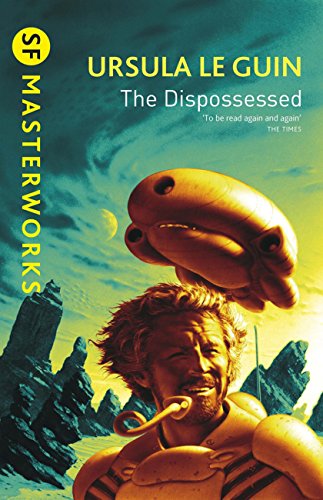
The worlds of Tau Ceti are ideologically and politically divided. Anarchist-Syndicalist (Odonian, in the language of the book, after its chief philosopher) Anarres orbits Urras, a world divided between Stalinism and Capitalism. Physicist and temporal theoretician Shevek must travel between the two worlds to complete his work on the General Temporal Theory, and reconcile his own past in the light of a new and much different society.
I think I’ve put off talking about the Dispossessed because I love it. It’s such, such a good book – perhaps not my favourite LeGuin (that’s Always Coming Home, or maybe Word for World is Forest, or perhaps Lathe of Heaven, or the Dispossessed, or, or, or…), and I can’t even say the best either (because Ursula K “every book a banger” LeGuin didn’t really write bad books), but a formative one.
LeGuin is too good a writer to make Anarchist Anarres perfect. Ideological and personal issues plague Shevek’s life there, and the novel is as much about the dissidents of Utopia as it is about how fucking shitty Urras is. The Dispossessed is a philosophy, an exploration of competing visions of utopia (and dystopia), a warning, a lesson, a chance to reflect and to reassess, and it’s also a bloody great adventure story and science fiction masterwork to boot. The worlds are well realised, the conflicts all too believable, and the tensions between people, planets, systems of thought, all paced and plotted beautifully. It is one of the great expressions of how Scifi can create wonders while asking – demanding – us to use the imagined future to change the present.
Again, like with Lord of Light, it’s not really a recommendation. Just go fucking read the Dispossessed, alright?
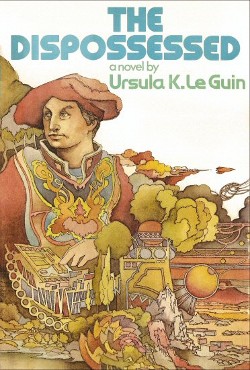
Liam: I think the Dispossessed is an interesting pick here because, as Aaron points out, it’s not really a utopia. Anarres is a challenging place to be, both in a geographic sense – as the Anarresti know, a key reason that the societies on Urras allow them them to exist is that they want the resources of the moon exploited but don’t want to deal with living there – but also politically, because an Odonian society is still made up of humans, and no matter its guiding philosophy is still subject to all the weaknesses of humans in large groups. We naturally sympathise with Shevek as our protagonist, but he’s an awkward and difficult person, someone who is drawn into conflict by his very nature – a nature which is very much in keeping with Odonian principles, but not necessarily with the lived reality of trying to get along in a society where people tend towards compromise and conformity even as they insist that they’re not doing that at all. Shevek’s disgust at the ways he sees life lived on Urras is set against his frustrations with his own society, and it gives the book endless scope for exploration, delving into the hard questions it presents and offering up answers that are always, in some way, flawed.
A bit like Aaron, it’s hard to know if this is my favourite LeGuin, because I love so much of what she’s written – but if I had to pick a single one of her books to tell people to read? It would be this one every time.
The entire fucking Culture series
Use of Weapons, Iain M Banks
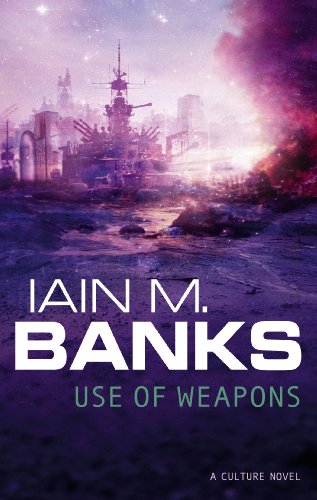
The Culture is a utopia of hedonists, artists, free-thinkers, doo-gooders, non-interventionists, expansionists, isolationists, historians, bastards and billions upon billions of people just getting on with doing whatever they want. De jure a vague collective of every sapient member and de facto run by cabals of AI so advanced they may as well be gods, the Culture is the self-confessed peak of humanoid-and-mates civilisation and the truest expression of Utopia in any science fiction yet written. So why is Cheradenine Zakalwe out on the frontier getting shot, beaten, left for dead and reliving his memories of a long-ended civil war?
If you want a relatively modern science fiction exploration of Utopia here it sits. Iain M Banks, writer virtually beyond compare, uses the culture series to explore many different themes, story types and, well, general vibes, that can emerge from the questions posed by Utopia. How does a Utopian society interact with those around it? How do people within a Utopia find ways to express themselves counter to the general trajectory of society? What motivation, or even ability, do inhabitants of a utopian society have to act outside of it? What if you see the utopia and think “actually I want something different”?
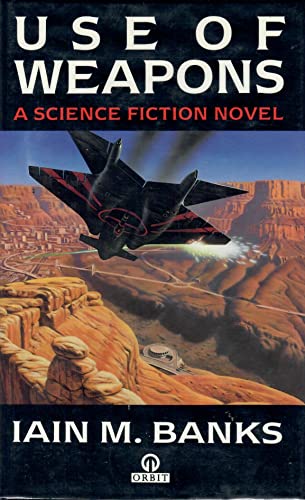
I came perilously close to just flat recommending the entire Culture series – which, to be honest, I still do, they’re all great and well worth a read. Nine books and a short story collection and all of them great. You can, at least theoretically, start with any book – my favourite is Excession, or the sublimely painful Hydrogen Sonata, but Use of Weapons is a perfect on ramp. It’s quick, pacey, not reliant on knowledge of the series and informs later books. It’s a great example of Banks’ ability to wring pathos out of action and humour, his tricks with non-linear narratives and – most of all – his unerring character work that elevates everything he wrote. His loss to us, not just as an author but as a political commentator and a human, is immense.
Black Library Recommend – Longshot, Rob Young
Sergeant Darya Nevic is the top sniper of the Cadian 217th, hunting through the ruins of Attruso for an elusive T’au adversary. Adjusting to her place with the Cadians as a transplant – not a trueborn Cadian – and to her new found role as a war hero and figurehead, there are battles to be fought internally, within Imperial society and against the threatening, terrifyingly powerful and able enemy.
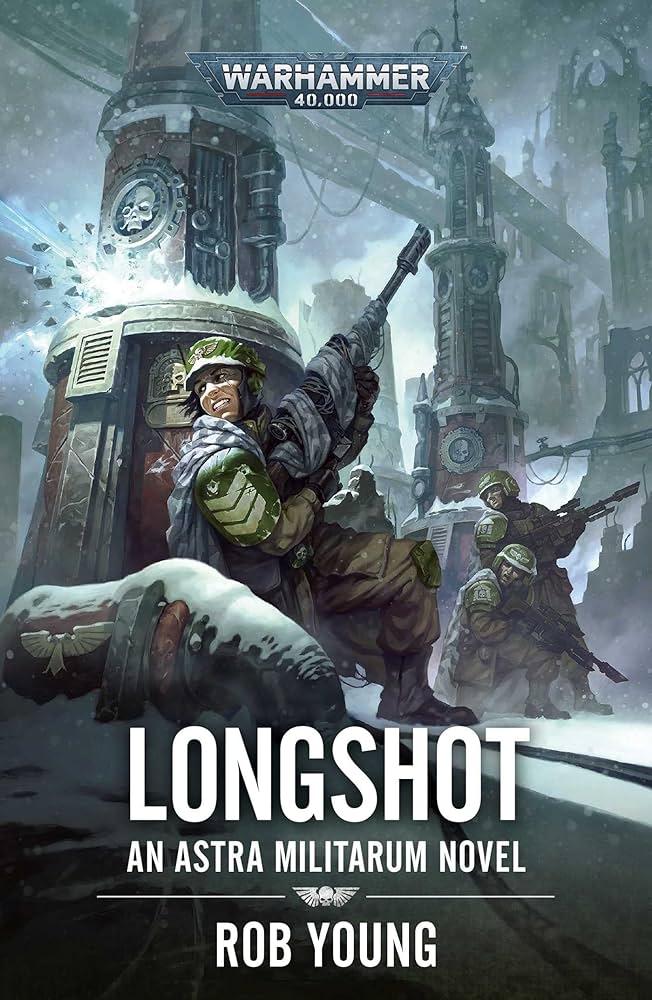
A Utopian pick was hard for this one – Utopia isn’t allowed in the 40k universe. We see it most often ground under the weight of ceramite in 30k, another bright, brittle globe of humanity’s diaspora crushed under the fascist heel of the Space Marines. So where do we look for Utopia? Despite very variably impactful attempts to grimdark up the T’au, they have the closest thing that we can see in the 40k Universe, for all that it is constantly under siege. I wanted to recommend Longshot not because it depicts the T’au as utopian, but because it doesn’t quite manage to paint them as dystopian enough to convince.
It’s tricky to talk about without spoilers, but the consistent image of the T’au in the book is as an enemy, very much the 2,000 point Crisis Battlesuit horde you might face in the meta (don’t @ me, I dunno what a meta list looks like alright). When that image shifts to a very different one, it is at least a version of a much better life than the Imperium offers on every level. The tone shifts, the language shifts, the colour shifts, creating a believably “better” world in environment, treatment, life, science, art, empathy, kindness. The T’au do, indeed, do it better. They do it well enough that it undermines the plot of the book – making the final fifth a difficult sell as a recommend. Aside from the, albeit slightly faltering, look at the OpFor utopia, it’s a fun read about snipers, heroes, and imperial guard and carries on the ongoing Black Library metaplot of “what are the Cadians up to these days?” which has been enjoyable wherever it crops up.
Next time: Let’s get Horrific
Questions, comments, suggestions? Smarting that I didn’t recommend Beyond this Horizon due to my increasingly ridiculous reluctance to recommend Heinlein without a billion caveats? contact@goonhammer.com or leave a comment below.
